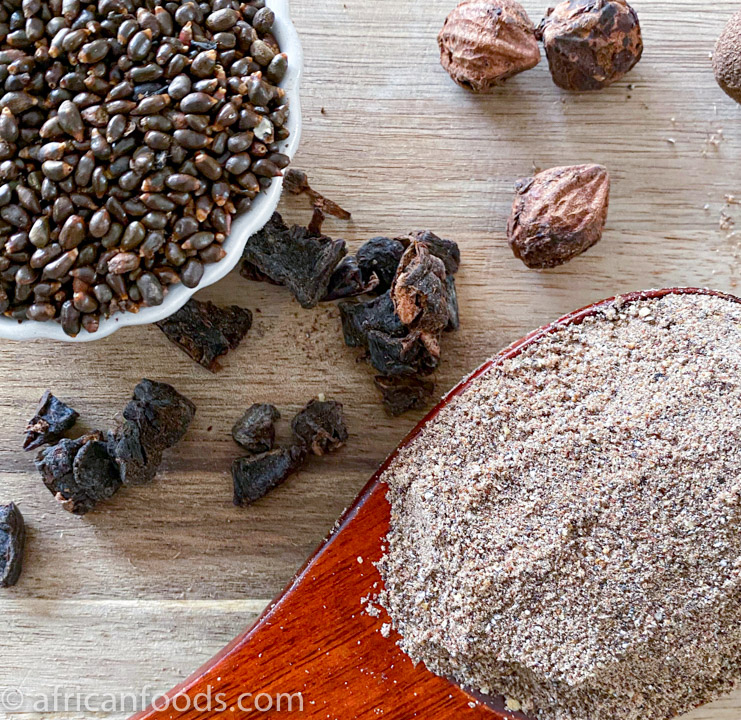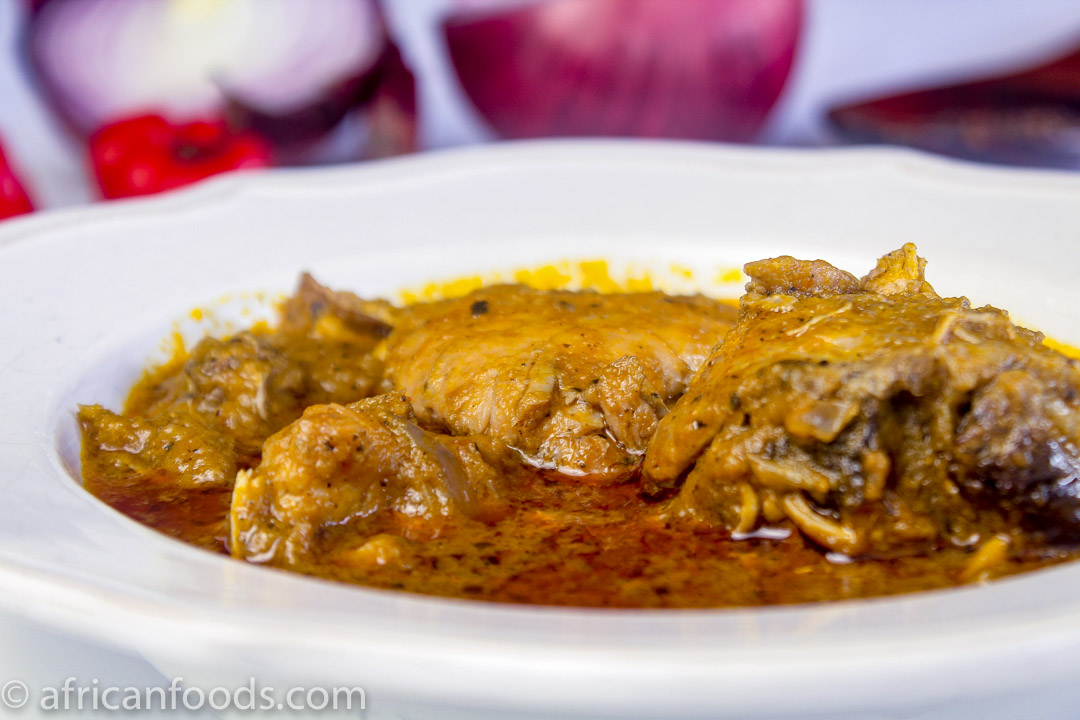Banga Soup
Banga soup or palm fruit soup is indigenous to West Africa. Various herbs and spices combine to create a delicious hearty meal that will make you come asking for more.
Banga soup is a delicious African soup made from freshly squeezed juice from the palm nut fruit, prepared with carefully selected fish, meat and a host of authentic African spices. You will come back for seconds.
Banga soup (palm fruit soup) is one of the most popular soups across West Africa. Traditionally this soup is prepared by boiling palm fruits in water until the pulp softens. The juice is is now sqeezed out by pounding the fruit in a mortar. Then, straining the the nuts and skin(shaft) of the palm fruit leaving the juice behind for cooking.
These days you do not have to do all that work of pounding and extracting the palm fruit juice as the palm concentrates are sold in cans and available globally in African food shops. They come in 880mls cans. And quite handy cutting the cooking time by over fifty percent.
Banga Spices
The secret to the delicious taste of this soup lies in the blend of spices used. Aromatic herbs and spices combine to give you a well deserve experience.

How To Cook Banga?
Banga soup
|
Servings: 6 |
Prep Time: 40min |
Cooking Time: 40min |
Ingredients
- 1 packet of chicken containing about ten chicken thighs or drumsticks
- 6-8 cow feet pieces(omit if you do not like this it will still taste great without it)
- 500g of tripe cut bite-size(again skip if you do not want this)
- 1 800mls can of palm fruit concentrate
- 2 onions chopped
- 2 garlic cloves finely choppe
- one thumb size ginger finely chopped
- 2 medium dried fish ( you will find this in African food shops)
- 2 tablespoons of crayfish
- 1 tablespoon dried bitter leaves
- 2 tablespoons Beletete leaves(Substitute with mint leaves or increase bitter leaves to 2 tablespoons)
- 1-2 tablespoon paprika (use less or more as you like it)
- Banga spice mix (click on the link for directions on how to make your own) or if using store-bought spice mix, use 2 tablespoons
- 1/2 teaspoon of baking powder(optional)
- 1 tablespoon olive oil
- salt to taste
Method
Clean tripe and cow feet then, transfer to a pot with the chicken.
Pour in a litre of water and one of the chopped onions. Sprinkle one tablespoon of paprika, the chopped ginger garlic and salt cooking on medium heat.
The chicken cooks faster and is ready in about 15 to 20 minutes, so, take out the chicken. Drizzle a bit of olive oil, salt and pepper then, brown chicken in a preheated oven set at 450F for about 20-25 minutes turning once. Then, set aside.
While chicken is in the oven, you may want to add a little baking soda to tenderize the cow feet and reduce cook time which may take one hour or more to cook tender. With baking soda I got it tender from start to finish in about 45 minutes.
Add the cleaned, dried fish and crayfish cooking for another 10minutes.
Now, add the main ingredient, the palm fruit concentrate, mashing and stirring well to melt.
Allow the palm sauce to cook for about ten minutes before adding the spices, the herbs(beletete and bitter leaves), the oven-browned chicken you set aside earlier on and the remaining paprika.
Continue cooking for five minutes then, stir in the remaining chopped onions. Adjust seasoning.
Let simmer for about ten to fifteen minutes and serve immediately with any of the following: a bed of rice, starch, pounded yam, eba, fufu.
Recipe provided by www.AfricanFoods.co.uk
Want regular updates on African cuisines and food recipes? What about unique health information about these foods - what to eat and avoid to keep healthy from the list of African recipes available?
Fill in the form below to subscribe to our Newsletter - AfricanFoods Weekly?
Worried about spamming? We are too. We will never ever give or pass on your information to anyone else. We will only use your email address to send you your copy of our weekly newsletter. We do have a zero tolerance to spam. We subscribe to a very strict policy on the handling and use of information we gather on this site! We also get paid for affiliate links on this site. See our privacy policy for further details.
Follow us on social media:
Get Our Weekly Newsletter. Subscribe Today. It's FREE.
Subscribe to African Foods Weekly
Get African food recipes, cooking tips, and healthy eating info delivered to your inbox every week. Simply fill in your email below and click SUBSCRIBE .
(Your information will not be shared)











New! Comments
Have your say about what you just read! Leave me a comment in the box below.